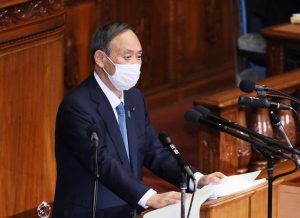Japan’s ruling party lost all three parliamentary by-elections held on April 25, loosening Prime Minister Suga Yoshihide’s grip on power ahead of national elections later this year.
Suga said he takes seriously the results, which are seen as reflecting voter discontent with his government’s handling of the coronavirus pandemic as well as scandals involving his ruling Liberal Democratic Party.
“I humbly accept the election results as the judgement by the people,” Suga told reporters Monday. “We will further examine the results and correct what needs to be corrected.”
The votes to fill vacant seats — one in the lower, more powerful, house and two in the upper house — were the first significant elections since Suga took office in mid-September. Two of the seats were left by ruling party lawmakers who resigned over money-for-favors scandals, and the third had been held by a main opposition lawmaker who died of COVID-19.
The by-elections were considered a major litmus test for Suga, who must call national polls before the October 21 end of the four-year term for the lower house. His term as prime minister also ends on September 30.
Suga had enjoyed high support ratings of around 70 percent when he replaced Abe Shinzo, who resigned as prime minister because of health reasons after becoming Japan’s longest-serving leader.
But Suga has seen his popularity plunge over a series of money-for-favors scandals by his party lawmakers and criticisms over his handling of pandemic measures and slow progress on vaccinations. Suga has also faced criticisms for pushing for the Olympics amid the pandemic uncertainty.
The seats from Hokkaido, Nagano, and Hiroshima were won by candidates backed by the main opposition Constitutional Democratic Party of Japan.
“Voters made a severe verdict on the Suga Cabinet,” said the CDPJ secretary general Fukuyama Tetsuro. “Voters have become increasingly discontent with scandals of politics and money, and slow responses to the coronavirus.”
A leadership change, however, is unlikely since opposition parties are not quite seen as a responsible, viable alternative. The LDP has only lost power twice since its founding in 1955, from 1993 to 1996 when an unwieldly coalition took the reins, and most recently from 2009 to 2012, when the Democratic Party of Japan was voted into power. The DPJ’s stint at the reins, marked by rapid-fire turnover in prime ministers and dysfunction in the bureaucracy, continues to drag down perceptions of the current opposition.
































